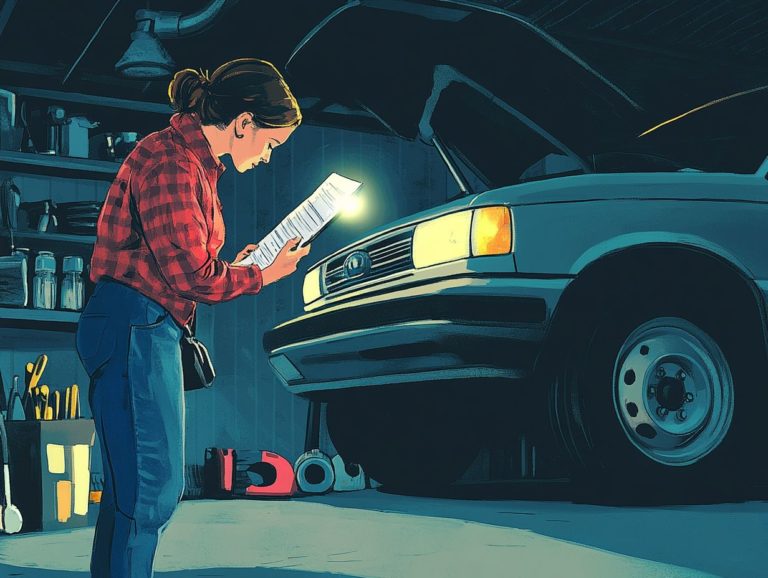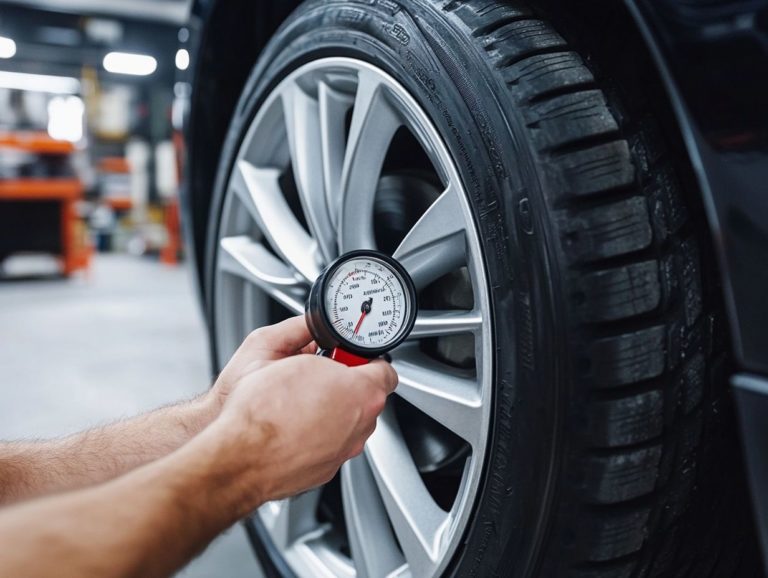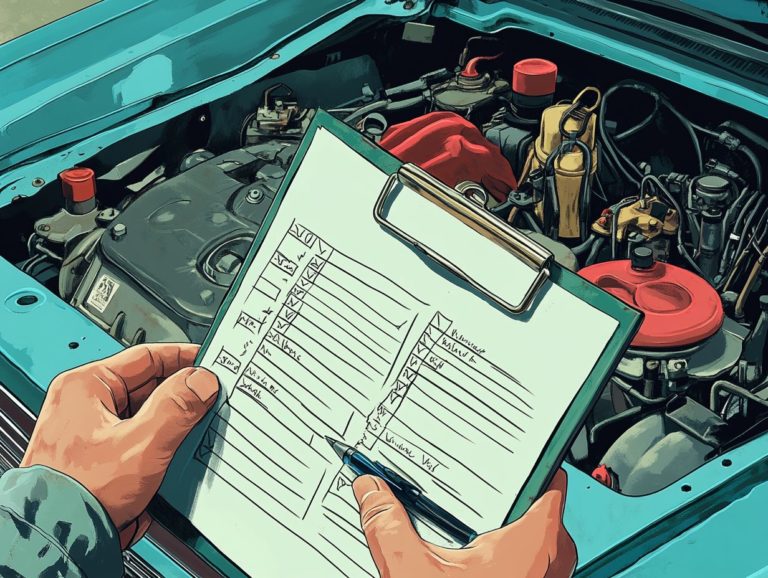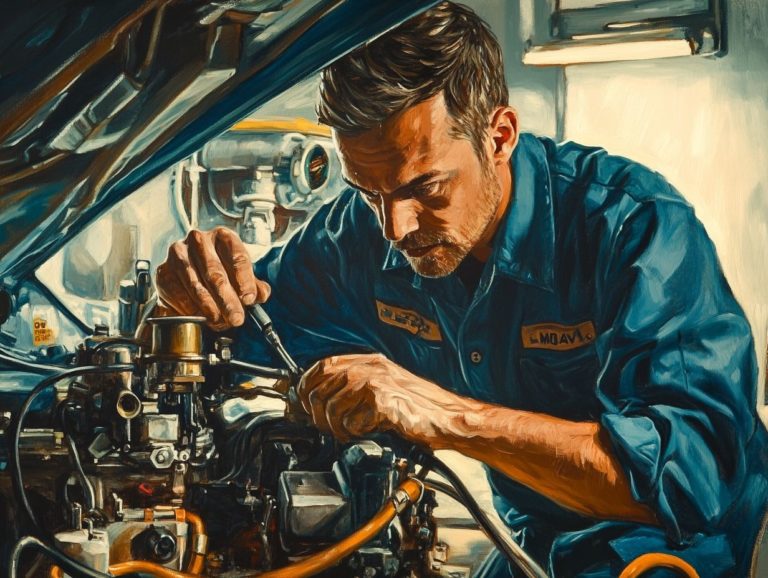Car Inspection Myths: What’s True and What’s Not?
Car inspections are an essential part of vehicle maintenance. However, they are often surrounded by myths and misconceptions that can leave many drivers confused.
Wondering what to expect during an inspection? Or why regular checks are important? Get ready to bust some car inspection myths and drive safely!
This article will walk you through the inspection process and provide valuable tips to help your vehicle pass with flying colors.
Understanding the importance of car inspections ensures your vehicle remains safe and performs at its best keeping you and your loved ones protected on the road.
Contents
Key Takeaways:
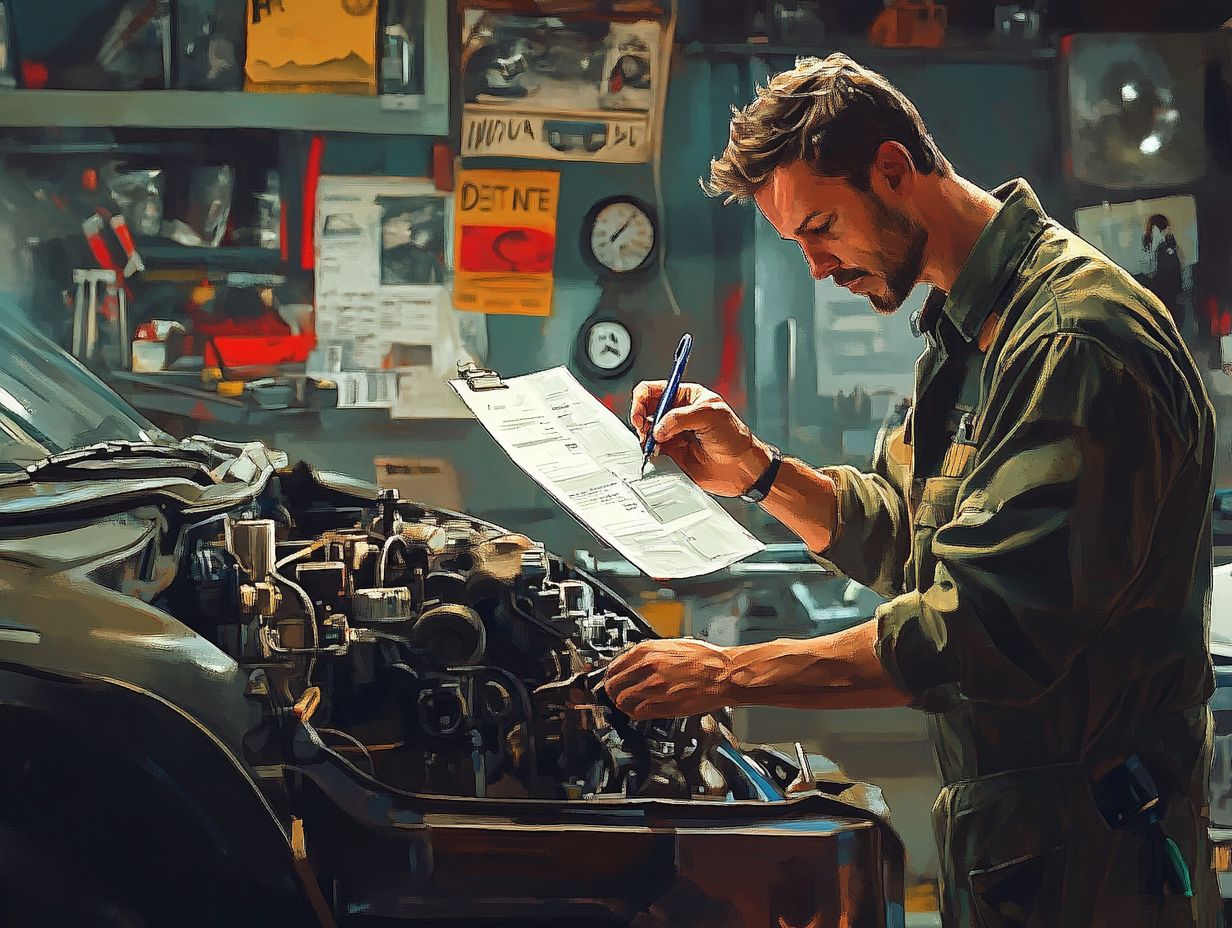
Regular car inspections are crucial for your safety and vehicle performance.
Neglecting inspections can lead to dangerous risks and expensive repairs.
Being prepared for inspections boosts your chances of passing.
What is a Car Inspection?
A car inspection is a comprehensive process designed to assess the overall health and safety of your vehicle. It ensures your vehicle meets essential safety standards and regulations.
During this process, trained mechanics conduct a thorough visual inspection, examining various components such as brakes and engine performance.
This proactive approach helps identify potential issues early, which can prevent costly repairs and enhance fuel economy.
Beyond standard inspections, courtesy inspections allow you to evaluate your vehicle s condition without the pressure of immediate repairs.
Regular maintenance checks, like oil changes and tire rotations, are essential for prolonging your vehicle’s life and peak efficiency.
Independent mechanics and specialized shops play a vital role in this process. They offer personalized service and accurately diagnose issues without dealership incentives.
This gives you peace of mind, knowing your vehicle is in good hands and its well-being is their top priority.
Common Myths About Car Inspections
Common myths surrounding car inspections can lead to misunderstandings about what the inspection process truly involves.
You might think of inspections as just a formality, but delaying them could cost you. They play a critical role in uncovering engine issues and ensuring your vehicle meets safety standards.
This can have significant implications for your insurance rates and repair costs.
Debunking Misconceptions
Debunking misconceptions about car inspections is crucial for building a deeper understanding of automotive care. Many believe inspections are only necessary when buying or selling a vehicle.
However, regular inspections by skilled mechanics are essential. They not only uncover hidden issues but also ensure that all safety features operate correctly.
You might think that if your car runs smoothly, it doesn t need an inspection. This couldn t be further from reality. Critical issues, like brake wear, can develop quietly.
It s easy to overlook these potentially dangerous conditions until they escalate into serious safety hazards or expensive repairs. Prioritizing routine inspections protects both your investment and your safety on the road.
It s time to dispel the myth that only visible signs of trouble warrant a visit to the mechanic.
Importance of Regular Car Inspections
The importance of regular car inspections cannot be overstated; they are vital for ensuring your vehicle remains safe and reliable throughout its lifespan.
By following a consistent maintenance schedule, you can detect and address potential issues early, significantly reducing the risk of breakdowns.
This proactive approach helps you adhere to safety standards and elevates overall automotive safety, granting you peace of mind as you navigate the roads.
Maintaining Safety and Performance
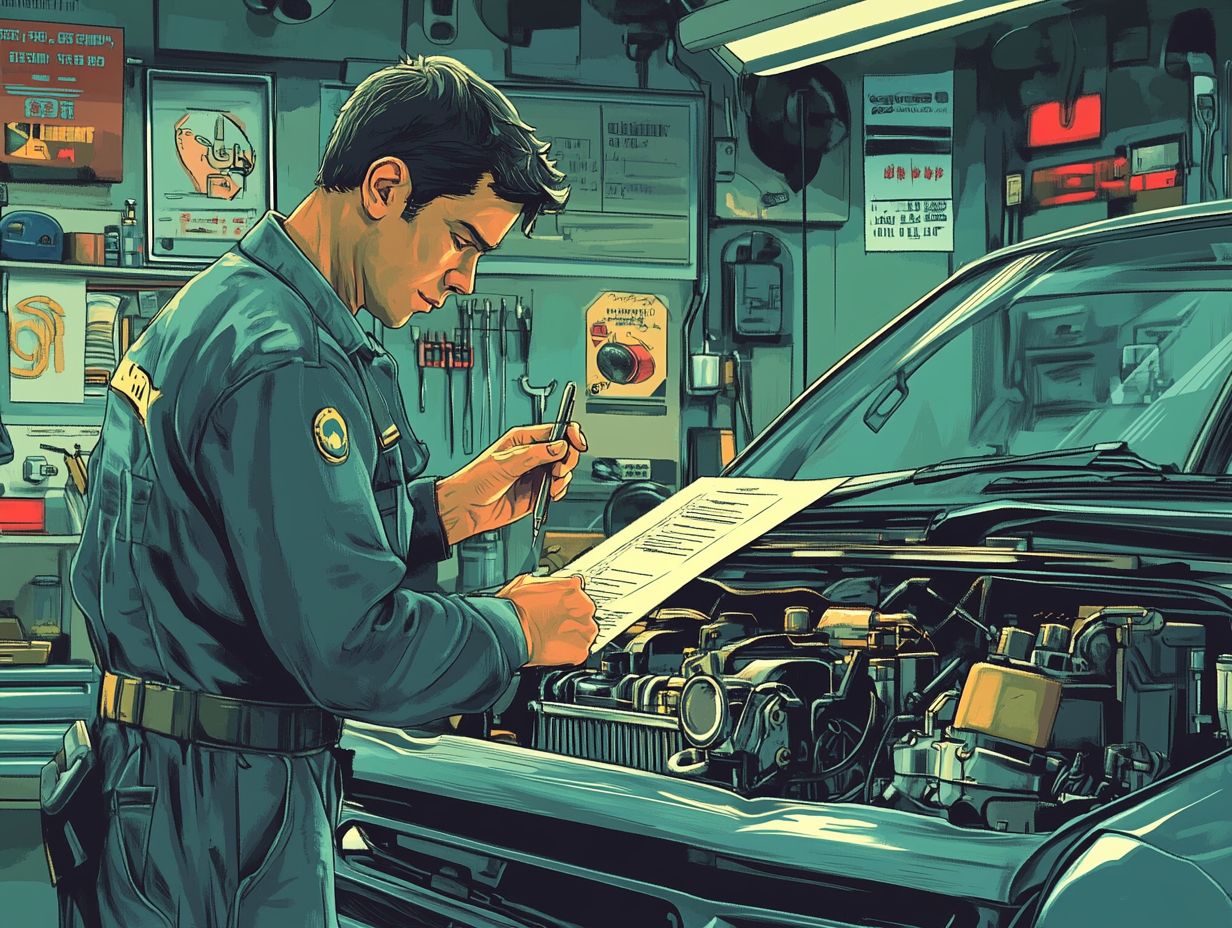
Maintaining safety and performance through regular car inspections is crucial for ensuring that every component of your vehicle operates effectively, from the brake system to engine performance.
These inspections allow trained mechanics (certified by the National Institute for Automotive Service Excellence) to assess your vehicle s unique needs and provide tailored repair recommendations, ensuring that all safety features are intact and performance remains at its peak.
During these evaluations, specific safety and performance components are examined, including the condition of your brake pads and rotors, engine fluid levels, and the overall health of the engine.
Check your oil, coolant, and brake fluid regularly. These fluids help your engine run smoothly and prevent overheating. Meanwhile, a well-maintained brake system is essential for delivering reliable stopping power.
Regular inspections also help you identify potential issues before they become major headaches, allowing you to take preventative measures that enhance both the longevity and reliability of your vehicle.
What to Expect During a Car Inspection
During a car inspection, you can anticipate a meticulous evaluation of your vehicle’s various systems, employing advanced diagnostic tools and equipment for comprehensive diagnostics.
The inspection process typically includes a visual examination of essential components, alongside diagnostic tests designed to uncover any potential issues that could jeopardize safety and performance.
All of this is carried out by professional ASE-certified technicians in a reputable mechanic shop, ensuring your vehicle receives the care it deserves.
Inspection Process and Checklist
The inspection process involves a checklist followed by trained mechanics, ensuring that every aspect of your vehicle is thoroughly evaluated.
This checklist typically encompasses critical items like checking for fluid leaks, inspecting the brake system, evaluating the engine, and verifying the functionality of safety features, all of which contribute to a comprehensive overview of your vehicle’s health.
During the fluid leak assessment, technicians examine essential areas such as the engine, transmission, and cooling systems. After all, leaks can indicate more significant issues lurking beneath the surface.
Regarding the brake system, they pay close attention to the pads, rotors, and fluid levels, recognizing that effective braking is paramount for your safety.
The engine evaluation covers important elements like oil levels, air filters, and belt conditions to ensure optimal performance.
Lastly, verifying crucial safety features, such as airbags and lights, is vital to guarantee that all systems are operational, ultimately safeguarding both you and your passengers on the road.
Tips for Passing a Car Inspection
Want to pass your car inspection with flying colors? Follow these simple tips!
Regular maintenance services such as routine checks of vital fluids, tire condition, and brake performance can significantly reduce the likelihood of issues cropping up during the inspection. By taking these steps, you not only sidestep repair recommendations that might result in costly delays but also ensure your vehicle is in top-notch condition.
Preparing Your Car
Preparing your car for an inspection should be a proactive endeavor, starting well in advance and focusing on routine vehicle maintenance to ensure all systems are operating at peak efficiency.
Simple actions, such as checking fluid levels, inspecting tire pressure, and confirming that all lights are functioning, can significantly smooth the inspection process and help you avoid unnecessary repairs.
Plus these essential checks, take a moment to assess the condition of your windshield wipers and ensure that your brakes are responsive and free from any unusual noises. It s also wise to check your car’s manual for maintenance schedules you might have overlooked.
Furthermore, cleaning your car inside and out not only makes it look good it also helps create a smooth inspection experience. Don’t skip this step!
Lastly, scheduling an appointment with a professional mechanic for a pre-inspection assessment can help you identify any potential issues before the official inspection takes place, giving you peace of mind.
Schedule your car inspection today and keep your vehicle performing at its best!
Consequences of Skipping Car Inspections
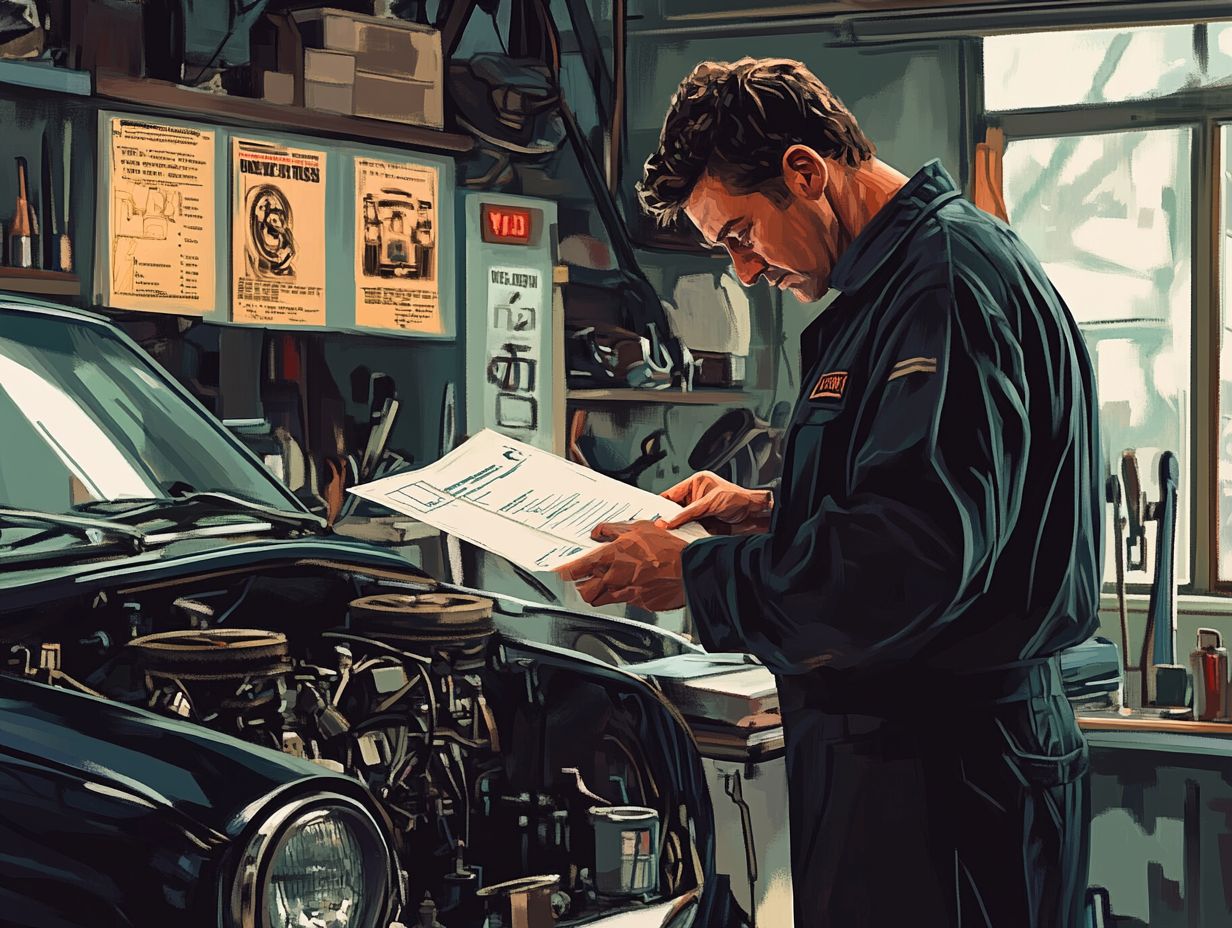
Skipping car inspections can have serious repercussions, leading to many vehicle issues that threaten both your safety and your wallet.
When you neglect regular inspections, you put your vehicle’s safety at risk and heighten the risk of engine problems, fluid leaks, and compromised safety features. This could also lead to increased insurance rates.
Prioritizing these inspections is essential for your safety and your vehicle’s performance.
Potential Risks and Costs
The potential risks and costs of skipping car inspections can manifest in various ways, from immediate safety hazards to long-term financial burdens. Without regular inspections, important safety problems may slip under the radar, leading to significant repair costs that could have been avoided with proactive maintenance.
Think about it: common issues like worn brake pads, faulty headlights, or engine oil leaks often arise from neglecting routine checks. These problems endanger your safety and that of your passengers and can lead to a dramatic increase in repair expenses.
Consider the consequences of failed brakes or an overheating engine due to delayed maintenance. You could be facing hefty bills for emergency repairs, towing services, and even potential legal liabilities if an accident were to occur.
Therefore, prioritizing regular inspections serves as both a safeguard for your personal safety and a smart financial strategy to keep unexpected costs at bay. Don’t wait until it’s too late! Regular inspections can save you from costly repairs.
Why You Can’t Ignore Car Inspections
Regular car inspections are essential for ensuring your vehicle’s ongoing health and compliance with safety standards, protecting both you and your passengers. By identifying potential issues early, these inspections help maintain your car s well-being and prevent safety-related incidents, ultimately enhancing your automotive experience.
This proactive approach not only keeps your vehicle running smoothly but also helps safeguard against unexpected breakdowns and costly repairs. When you choose routine inspections, you’re investing in your car’s longevity, enabling it to perform at its best for years to come.
Addressing minor repairs before they escalate into major problems is not just wise; it s financially savvy as it minimizes the risk of hefty bills. The attentive care you provide through consistent inspections not only enhances safety but also fosters a sense of reliability, ensuring your vehicle operates at its peak.
Frequently Asked Questions
What is a car inspection?
A car inspection is a thorough examination of a vehicle’s components, systems, and overall condition. This is usually performed by a certified technician to determine if the vehicle meets safety and emission standards.
How often should I get my car inspected?
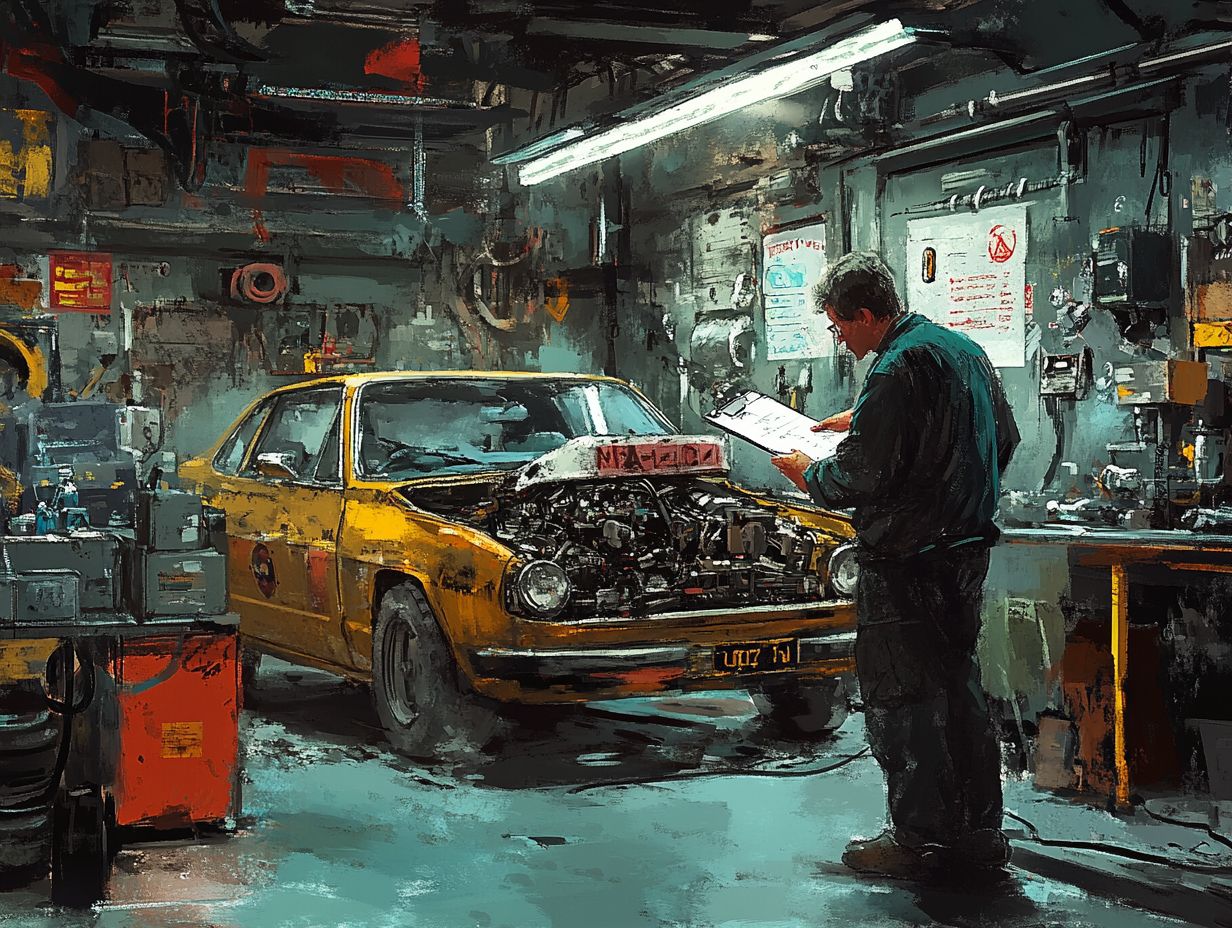
This varies by state, but most require a car inspection every 1-2 years. It’s important to check with your local DMV for specific requirements.
Are all car inspection myths false?
No, some car inspection myths do have a basis in truth. However, it’s important to research and consult with a trusted mechanic to determine the validity of these myths.
Is it true that car inspections are just a way for mechanics to make more money?
No, car inspections are necessary for safety and environmental reasons. While some unscrupulous mechanics may exist, most are just doing their job to ensure your vehicle is safe to drive.
Do I need to get a car inspection if I just bought a new car?
Yes, even new cars may have defects that could pose a safety hazard. It’s best to have a professional inspect your vehicle before driving it on the road.
Can I perform my own car inspection?
While you may check some basic components, a thorough car inspection should be conducted by a certified technician who has the knowledge and equipment to properly assess the vehicle’s condition.

